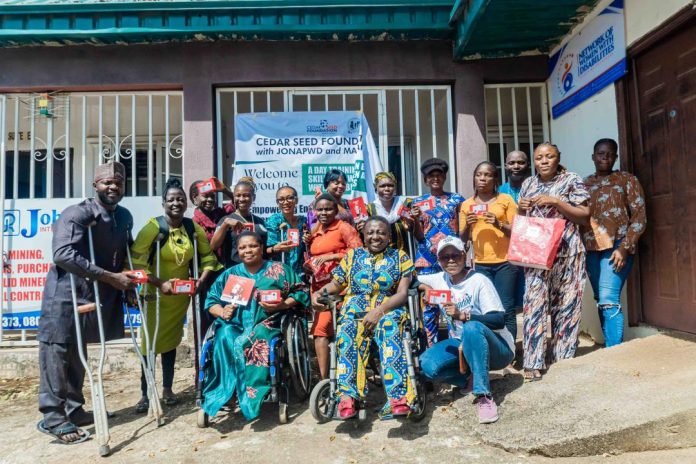In a groundbreaking move to address the persistent barriers faced by Persons With Disabilities (PWDs), Cedar Seed Foundation (CSF), a disability-inclusive organization, has launched the Accessibility 365 (A365) Hall of Fame and Shame project. The initiative aims to dismantle physical and social obstacles that prevent PWDs from accessing public and private buildings in the Federal Capital Territory, Abuja.
The launch, held in Abuja, saw the collaboration of notable partners, including the Network of Women with Disabilities (NWD), the Joint National Association of Persons with Disabilities (JONAPWD), and the MacArthur Foundation. The project underscores the urgent need for inclusive infrastructure in Nigeria’s public spaces, according to CSF Founder and Executive Director, Lois Auta.
The Alarming Reality of Inaccessibility
Auta painted a sobering picture of the current state of infrastructure accessibility in Abuja, citing a recent CSF survey that revealed widespread challenges faced by PWDs. “Many buildings in Abuja, including critical government and healthcare facilities, do not meet accessibility standards,” she noted.
Facilities deemed inaccessible include the Federal Secretariat Abuja – Phase 1, Eagle Square Restaurant, Maitama General Hospital, Newton Park Hotels and Resort in Wuse Zone 4, and the National Open University of Nigeria Special Study Centre in Garki 2. Others on the list include Wuse Market, Nwakpabi Plaza in Area 3, Children’s Amusement Parks and Zoo in Asokoro, and St. Jude Catholic Church in Kubwa.
According to Auta, these establishments fail to meet basic accessibility criteria, such as ramps, elevators, designated parking spaces for PWDs, and accessible restrooms.
“Despite national and international policies promoting inclusivity, PWDs are often left struggling for basic access, highlighting the disconnect between policy and practice,” she added.
A365: Celebrating Progress, Calling Out Failures
The Accessibility 365 Hall of Fame and Shame project shines a spotlight on both ends of the accessibility spectrum. While some establishments have earned a spot in the Hall of Fame for adhering to inclusive standards, others have landed in the Hall of Shame for failing to provide basic accessibility features.
Prominent entries in the Hall of Fame include Transcorp Hilton, Cedar Crest Hospital, Safehost Schools, the Ecumenical Centre, the British High Commission, and Millennium Park. Private establishments such as Tobix Garden, Drumstix, Standard Chartered Bank, and Jabi Lake Mall also made the list.
“These establishments demonstrate that accessible infrastructure is achievable and must become the norm rather than the exception,” Auta emphasized.
Conversely, the Hall of Shame serves as a wake-up call for establishments that fall short of accessibility standards. By naming these buildings, CSF aims to hold stakeholders accountable and drive a renewed commitment to inclusivity.
Advocacy and Accountability
At the core of the A365 project is a call to action for stronger enforcement of accessibility policies, increased advocacy, and public awareness. Through media campaigns, training sessions for women with disabilities, and community outreach, CSF seeks to empower PWDs as advocates for their rights and inspire change across sectors.
“By spotlighting both accessible and inaccessible public spaces in Abuja, we hope to inspire greater commitment to accessibility standards across Nigeria,” Auta said. “Without barriers, there is no disability.”
A Legislative Mandate Unfulfilled
Despite legislative strides, including the Nigeria Disability Act 2018 and the United Nations Convention on the Rights of Persons with Disabilities (CRPD), the reality on the ground remains grim. Janet Alabede, Finance Officer at CSF, highlighted that while the laws provide robust frameworks for accessibility, the challenge lies in effective implementation.
“Legislation alone is not enough. Execution and enforcement are critical to ensuring these policies have real impact in the daily lives of PWDs,” Alabede remarked.
A Call to Action for All Nigerians
NseAbasi Ufford, Communications and Programme Officer at CSF, stressed the importance of collective responsibility in breaking down barriers. “The A365 project is a call to action for government agencies, private organizations, and Abuja residents to reinforce accessibility standards and support infrastructure improvements,” Ufford stated.
She called on policymakers, community leaders, and the general public to support the movement through advocacy, funding, and collaboration. “Together, we can dismantle physical and social barriers and create a truly inclusive society for all,” she said.
A Vision for an Inclusive Future
The launch of the Accessibility 365 Hall of Fame and Shame marks a significant step in the fight for inclusion. By recognizing progress and calling out failures, Cedar Seed Foundation and its partners are challenging stakeholders to prioritize accessibility in public and private spaces.
As the project gains momentum, the hope is that it will inspire a nationwide commitment to inclusivity, turning the vision of a barrier-free Nigeria into a reality. For PWDs, accessible infrastructure is not a luxury—it is a fundamental right.


